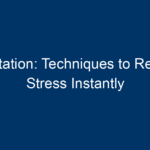In an increasingly fast-paced work culture, the concept of taking a break can seem counterintuitive. However, sabbaticals are gaining traction as a valuable strategy for professionals looking to recharge, enhance skills, and even shift career trajectories. This article will delve into the benefits of sabbaticals, practical steps for planning one, and real-life success stories that illustrate how stepping away from the grind can lead to profound personal and professional transformations.
What is a Sabbatical?
A sabbatical is traditionally considered an extended break from work, often lasting from a few months to a year. Unlike a vacation, which focuses on leisure, a sabbatical can encompass a wide array of experiences—such as travel, education, volunteering, or simply reflective downtime. This structured respite allows individuals to distill their thoughts, explore new avenues, and come back to work rejuvenated and often changed.
The Purpose of Taking a Sabbatical
The reasons for seeking a sabbatical are varied and deeply personal. They can include:
-
Burnout Recovery: After years of intense work, many professionals experience burnout. A sabbatical provides the much-needed space to recover, reflect, and plan for the future.
-
Skill Enhancement: For those looking to upgrade their qualifications or expertise, taking time off to enroll in courses or workshops can result in significant career advantages.
-
Personal Growth: Many use sabbaticals to pursue passions or interests outside of work—be it writing a book, learning a new language, or undertaking art projects.
- Changing Career Paths: Some individuals realize they want to change fields entirely. A sabbatical can offer the time to research new industries and gain essential qualifications or keywords to make that transition smoother.
Benefits of Taking a Sabbatical
1. Boosting Mental Health
In our goal-oriented society, it’s easy to neglect mental health. A sabbatical can be a rejuvenating experience, reducing feelings of anxiety and stress. Research shows that taking time off can combat burnout, leading to improved mental well-being and increased productivity upon returning to work.
2. Enhancing Creativity
Stepping away from your regular work routine can expose you to new ideas and perspectives. This infusion of creativity can create more innovative thinking, both personally and professionally. Engaging in different experiences during a sabbatical can foster creativity, offering fresh insights when you re-enter your field.
3. Gaining New Skills
Whether you opt for formal education, vocational training, or self-guided learning, a sabbatical can be a great time to acquire new skills. This can enhance your resume and make you more versatile in your current role or in a new career path.
4. Strengthening Networks
A sabbatical offers an ideal opportunity to connect with industry professionals, mentors, or community groups. Networking during this time can introduce you to new career opportunities and form essential professional connections.
5. Enhancing Work-Life Balance
A well-planned sabbatical can help recalibrate your work-life balance. It encourages individuals to reflect on their priorities and values, leading to more sensible decision-making and improved quality of life.
How to Plan Your Sabbatical
1. Define Your Goals
Before embarking on a sabbatical, it’s crucial to clarify your goals. Are you looking to travel, pursue further education, or engage in a personal project? Articulating these intentions will help you shape a fulfilling sabbatical experience.
2. Research Options
Explore various sabbatical opportunities related to your goals. This could mean researching educational programs, volunteering opportunities, or travel destinations. Consider how each option can contribute to your personal and professional development.
3. Create a Financial Plan
Taking a break often means adjusting your financial situation. Calculate your savings and budget for the time you’ll be away. This preparation can alleviate many financial concerns during your sabbatical.
4. Discuss with Your Employer
Communicate your sabbatical plans with your employer well in advance. Frame your request in a way that underscores how this time off will benefit both you and the organization. Many companies are increasingly supportive of sabbaticals, recognizing their value for employee retention and well-being.
5. Set a Timeline
Establishing a clear start and end date for your sabbatical can provide structure. Be realistic about how long you need and plan accordingly, taking into consideration potential re-entry challenges.
Navigating Challenges During Your Sabbatical
1. Dealing with Guilt
Many professionals experience guilt when stepping away from work. Recognizing this feeling as a normal response is important; it doesn’t diminish the necessity of taking time for yourself. Reframe your thoughts by focusing on the benefits to your mental health and professional growth.
2. Managing Re-Entry
Transitioning back to your job after a sabbatical can be daunting. Prepare for this reintegration by setting aside time to review industry developments, reconnect with colleagues, and integrate your new skills into your role.
3. Overcoming Career Concerns
Some fear that a sabbatical could harm their career trajectory. Counter this by thinking of the additional skills and perspectives you’ll gain during your time away. Many employers appreciate employees who take the initiative to invest in their personal and professional growth.
Real-Life Success Stories
1. The Teacher’s Journey
Laura, a high school teacher, found herself overwhelmed and burned out after a decade in the classroom. She decided to take a six-month sabbatical to travel through Europe, exploring various educational systems. Upon her return, Laura brought back innovative teaching strategies and revamped her curriculum, which reinvigorated her passion for teaching.
2. The Corporate Shift
John, a mid-level manager in a tech company, took a year-long sabbatical to study data science. He enrolled in workshops and completed hands-on projects during this time. After returning, he transitioned into a new role within his company that leveraged his new skills, increasing both his job satisfaction and income.
Conclusion: The Transformative Power of Sabbaticals
Sabbaticals are not merely breaks; they are transformative cycles that can reinvigorate your career and personal life. With thoughtful planning and execution, a sabbatical can lead to unprecedented growth—encompassing enhanced skills, improved mental health, and renewed passion for your career.
If you’re considering a sabbatical, remember that the journey begins with taking the first step. Define your goals, plan carefully, and embrace the journey. The break might just be the catalyst you need to transform your career.




